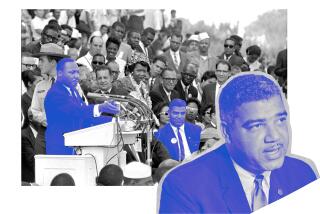‘No One Can Keep You Down Unless You Bend Your Back’
Prior to the Montgomery bus boycott, things were quiet on the surface. But beneath the surface, things were steaming. There was a lot of unrest due to the distrust on the part of blacks and hatred on the part of whites.
My grandmother had a 1938 Oldsmobile. My sister and I were passengers in the back. A police officer stopped my grandmother and asked her name. She told him. Then he asked, “Well, queen, didn’t you see that light back there?” She answered politely, but the way he addressed her upset me.
I remember as a teenager shopping downtown, receiving change and having the clerks drop the change in your hands instead of counting it because they didn’t want to touch you in any way. Some blacks had white friends. When the blacks visited, they always had to enter through the back door, as if they were going to work.
So much had gone on that people were tired but really didn’t know what to do. Out of this atmosphere, the boycott was called, when Rosa Parks refused to give up her seat to a white passenger.
During the boycott, blacks were jubilant because we were united. There were mass meetings to inform people of the progress of the boycott. There was a prayer service and the singing of spirituals like “Go Down, Moses” and “Nobody Knows the Trouble I’ve Seen.” After that, [the Rev. Martin Luther] King electrified the audience. The crowd left rejuvenated and ready to act in a peaceful, nonviolent manner.
Some whites took out their frustrations in the “Letters to the Editor” section of the Montgomery Advertiser. Over the years, blacks have kept the letters because they were humorous and showed how little Southern whites knew about blacks. Take this letter, written 40 days after the beginning of the boycott:
“Where is your appreciation, your sense of duty? Look around your home. Who furnished the ‘know how’ to build your homes and furnish them? Who furnished the ‘know how’ to prepare your foods and medicines, give you electricity, make your clothes, design and build your cars and every other convenience you so richly enjoy? That goes with civilization. Now what have you done for yourself?
“You are indebted to the white people of Montgomery for life itself. As the white doctor brought most of you into the world, the white man paid about 95% for your education, furnished you jobs and a place to live, etc. Now suppose the white people of Montgomery would not hire you any longer or give you a place to live; where would you go or do?”
Well, most of us blacks were born at home with the help of a midwife. When you consider the small wages that blacks were paid, we benefited whites more than they benefited us.
Black families encouraged their children by saying things like, “No one can keep you down unless you bend your back.” The lessons learned in Montgomery have made me strong. Not only do I ignore prejudices and other negative feelings, I rise above such thinking and find a better answer, a different way. I pass on to my students that awareness and confidence in self.
More to Read
Sign up for Essential California
The most important California stories and recommendations in your inbox every morning.
You may occasionally receive promotional content from the Los Angeles Times.










